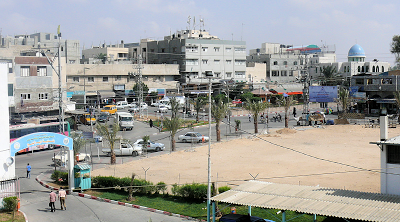 W Gazie kolejna niewidzialna rakieta, która “spadła za blisko” i zniszczyła dom palestyńskich Arabów
W Gazie kolejna niewidzialna rakieta, która “spadła za blisko” i zniszczyła dom palestyńskich Arabów
Frimet i Arnold Roth
 Zdjęcie ze strony internetowej władz miasta Deir al-Balah
Zdjęcie ze strony internetowej władz miasta Deir al-Balah
To zdarzyło się w poniedziałek, według informacji opublikowanej późnym wieczorem w poniedziałek, 15 stycznia:
Rakieta wystrzelona na Izrael ze Strefy Gazy uderzyła przez pomyłkę w palestyński dom w Deir al-Balah, poinformowały w poniedziałek media arabskie. W leżącym w centralnej Strefie Gazy mieście, dwoje mieszkańców Deir al-Balah odniosło ciężkie rany, a trzeci został lekko ranny. [“Rocket from Gaza Strip accidentally strikes Palestinian home“, Jerusalem Post, January 15, 2018]
Kolejna rakieta “spadła za blisko“. Wiemy o nich tylko z otwartych źródeł, ale informowaliśmy o blisko setce takich rakiet w ciągu ostatnich kilku lat. Niemal sto rakiet wystrzelonych w kierunku Izraela z intencją uczynienia jakichkolwiek szkód jakiemukolwiek celowi w Izraelu – ludziom, budynkom, pojazdom, wszystko jedno czemu – którym nie udało się dolecieć do granicy między Gazą a Izraelem. Spadły za blisko.
Upiornym aspektem tego nie jest jedynie bezlitosna, ślepa pogoń palestyńskich Arabów za dokonaniem szkód wszystkiemu, co izraelskie, choć tym z pewnością jest także. Ale gdzie są informacje medialne o tej rakiecie? I o tych poprzednich? Te rakiety mogłyby równie dobrze być niewidzialne, a w każdym razie nie przyciągają żadnej uwagi.
Odpowiedzią wydaje się być to, że nikogo to nie obchodzi. Arabowie raniący (lub gorzej) innych Arabów to nie jest temat, któremu poświęca się wiele uwagi poza Izraelem. A reżim Hamasu, który trzyma Strefę Gazy pod swoim doktrynerskim, żołnierskim buciorem, jest jeszcze mniej zainteresowany publikowaniem doniesień o tych rakietach, które “spadły za blisko” i o nieszczęściach, jakie sprowadzają na bezradnych palestyńskich Arabów, na których głowy, dachy i domy spadają.
Dla ludzi, którzy nie znają Gazy, Deir al-Balah brzmi prawdopodobnie jak jakaś mała wioska. Nie jest wioską: jest to miasto leżące pośrodku Strefy Gazy o populacji 60 tysięcy mieszkańców i z wieloma domami.
Poniedziałek był pracowitym dniem odpalania rakiet dla Gazańczyków, chociaż jeśli polegasz na nie-izraelskich mediach, miałbyś kłopoty ze znalezieniem informacji na ten temat. Times of Israel donosił
twoje uwagi, linki, wlasne artykuly, lub wiadomosci przeslij do: webmaster@reunion68.com




